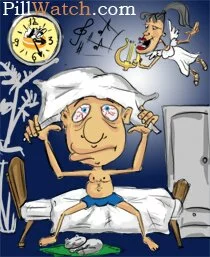
Sleepless nights are perfect for the poets, musicians, and artists. This is the best time for them to create their masterpieces, being on alone, having possibility to meditate over their feelings waiting for the inspiration to come. The longer these nights are, the more chances there are for the Muse to visit and help the artist.
However, we, ordinary people, those, who just perceive and enjoy art, but do not create it, usually suffer if a restful sleep cannot close our eyes and we have to spend hours in bed, lying sleepless. The state, when a person cannot fall and/or remain asleep for a reasonable period of time, is called insomnia in medicine. Its signs are: difficulty falling asleep, frequent waking up during the night with trouble returning to sleep again, waking up too early in the morning feeling tired and un-refreshed, which often results in daytime sleepiness, fatigue, irritability, inability to concentrate, and many other troublesome feelings.
Insomnia is classified as a symptom, not a disease. It can be caused either by sleep disorders (primary insomnia), or by other diseases and illnesses (secondary insomnia).

Sleep disorders to result in insomnia are: - sleep apnea it is a condition, when a sleeping person's breathing is interrupted due to the respiratory tract muscles disability; therefore, one has to wake up to resume breathing; - parasomnia - frequent nightmares, sleepwalking, violent behavior during the sleep, rapid eye movement (REM this may also include the movement of different parts of the body, causing a person to wake up); - circadian rhythm sleep disorders these happen most often in those persons, who travel much into different time zones (jet lag) and those, who experience a delayed sleep phase syndrome.
Psychological causes of insomnia include mental illnesses, such as anxiety disorders (stress, bipolar disorder, GAD generalized anxiety disorder, depression, etc.).
Physiological reasons for insomnia are multiple different diseases: Gastroesophageal Reflux Disease (a condition, when stomach acid flows upward into the throat), cardiovascular diseases, anemia, breathing disorders, kidney dysfunction, diabetes, HIV and others.
A number of other factors can contribute to the development of insomnia: fear and fatigue, medications and poor eating habits (too much, too little or too late at night), caffeine and alcohol, lack of exercise and naps during the daytime, changes in the routine life (moving to the other house or city, starting university), inappropriate sleep environment (noisy room, uncomfortable bed, too much light) and pregnancy.
There are three main types of insomnia due to the frequency and duration of the symptoms: transient (short term) insomnia, lasting from a single night to a few weeks; intermittent insomnia, which happens from time to time and chronic insomnia, occurring at least 3 nights a week over a month or more. Though, everyone knows the notion of insomnia, knows how it feels, very few people seek for medical help. That is right that this state is not life-threatening, still it may significantly worsen quality and conditions of life, resulting in increased irritability, constant sleepiness, trouble thinking clearly, inability to concentrate and remember things properly. Bad-quality night sleep increases the danger of motor vehicle accidents because of the drivers inattentiveness and fatigue.
As a result, insomnia must also be treated as any other condition. Since it may indicate about some other health problems, the first step in curing it is to define its reason. Therefore, medical treatment may include options to get rid of the primary cause, thus it will depend on the individual situation.
Sleeping tablets (zolpidem (Ambien), eszopiclone (Lunesta), zaleplon (Sonata) or ramelteon (Rozerem)) and hypnotic benzodiazepines (temazepam, diazepam, lorazepam, nitrazepam and midazolam) are the most often prescribed drugs for insomnia. Some antidepressants such as mirtazapine, trazodone and doxepin also help in fighting it. However, the use of these medications must be evaluated by a doctor, who will be able to warn about their side effects and the risk of getting addicted to them. Pregnancy and breastfeeding are usually the contraindications in using these pills.
On the other hand, a great number of insomnia cases can be treated non-medically - by avoiding the possible triggers of the symptom: caffeine, alcohol, stimulating activities, large meals before bed-time, etc.
Many people prefer to use traditional remedies to improve the sleep: herbal teas and warm baths, relaxation methods But this is a topic of another article, which can also be found at Pillwatch.com
Ivanna
| Tip for you : Sign-in with Your OpenID and post faster, easier and with easy access to all your past posts. | |
|
Your Nick: |
















